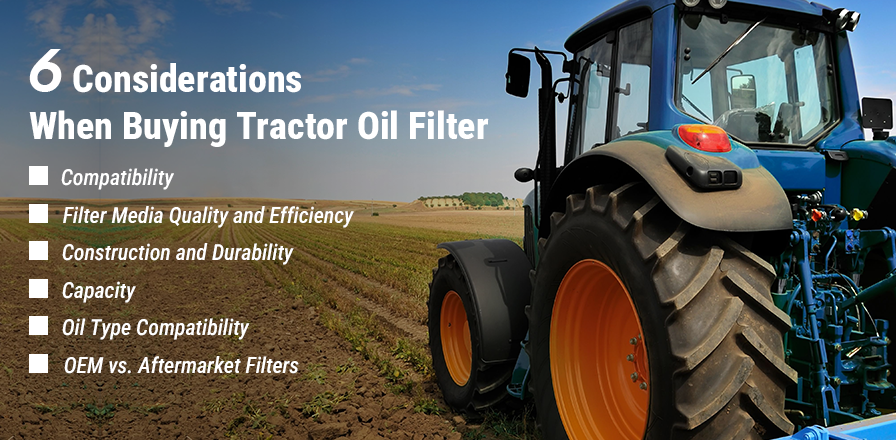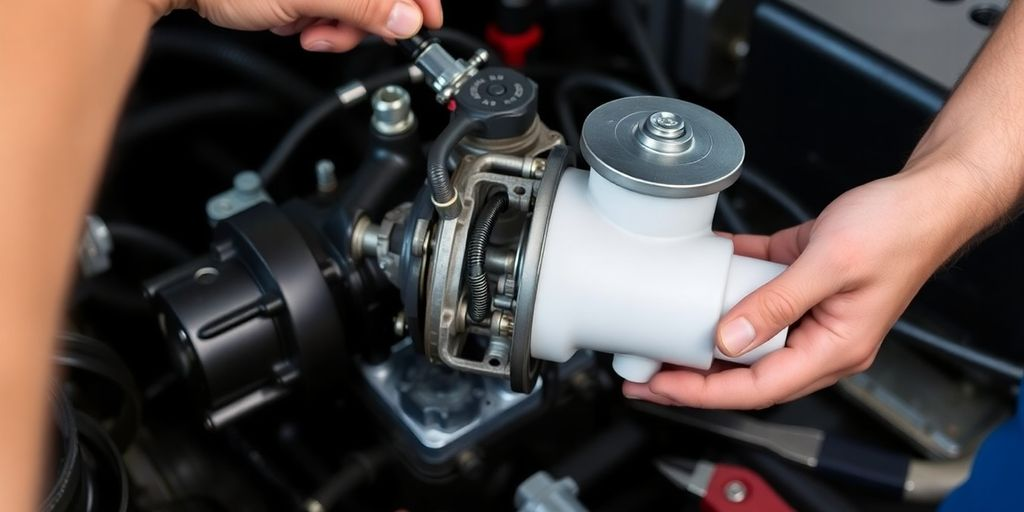The tractor oil filter is also called the engine oil filter. Your tractor is like a powerhouse, a vital piece of equipment for countless tasks. Many tractor parts work together to keep the iron machine running, and one of them, the engine, is the one that provides the major power. To keep your tractor engine running smoothly, the small but mighty component, the tractor oil filter, plays a huge role. The filter keeps the dirt, mud, and other contaminants out to ensure oil purity. Choosing the right engine oil filter isn’t just about grabbing any filter off the shelf; it’s about protecting your investment and ensuring peak performance. But with so many options available, how do you select the best one for your specific needs?
This guide will walk you through the essential factors to consider, helping you make an informed decision to keep your tractor’s engine healthy and efficient for years to come.
You may also be interested: How to Replace a Tractor Oil Filter? Replace Signs & Guide
Kubota L Series Tractor Oil Filter Lookup & Maintenance Tips
Why Your Tractor Oil Filter Matters So Much
Think of the tractor engine oil filter as the kidney of your tractor’s engine. Engine oil circulates constantly, lubricating moving parts and carrying away heat. However, it also picks up harmful contaminants along the way – tiny particles of metal from wear, soot from combustion, dirt sucked in from the environment, and sludge formed from oil breakdown.
What happens if you don’t replace the tractor oil filter on time? I can tell you that without an effective filter, these contaminants would circulate freely, causing abrasive wear on critical engine components like bearings, pistons, and cylinder walls. This leads to:
- Reduced engine efficiency and power
- Increased fuel consumption
- Premature engine wear
- Potentially catastrophic engine failure
A good tractor oil filter traps these harmful particles, keeping the oil clean and allowing it to do its job effectively. Regularly replacing it with the correct filter is a fundamental part of tractor maintenance.
What are the Different Types of Tractor Oil Filters
How do you know what type of oil filter you need? While variations exist, most tractors use one of two main types of oil filters:
- Spin-On Filters: These are the most common type found on modern tractors. They consist of a self-contained metal canister housing the filter media and necessary valves. You simply spin the old one off and spin the new one on, making replacement relatively easy.
- Cartridge Filters: This type is found more often on older models or some specific designs; these consist only of the filter element (the paper or synthetic media). This element fits inside a permanent filter housing built into the engine. Replacement involves opening the housing, removing the old cartridge, cleaning the housing, and installing the new cartridge, often with new O-rings or gaskets.
For most users reading this, you’ll likely be dealing with spin-on oil filters.

6 Key Factors for Choosing the Best Tractor Oil Filter
Selecting the right filter involves more than just matching the thread size. Here’s what you need to look at:
1. Compatibility
Compatibility is non-negotiable. The filter must be designed for your specific tractor. Check your tractor’s owner’s manual – it’s the ultimate authority. You’ll need to know:
- Tractor Make, Model, and Year: Filters are designed for specific applications.
- Engine Type/Size: Different engines within the same model range might use different filters.
Using an incompatible filter can lead to leaks, improper filtration, oil starvation, or even difficulty installing it.
2. Filter Media Quality & Efficiency
The filter media is the material inside the filter that actually traps the contaminants. The quality and type of media significantly impact performance.
- Cellulose Media: Traditional paper-based media. Good for standard oil change intervals and conventional oil. It’s generally the most affordable.
- Synthetic Blend Media: A mix of cellulose and synthetic fibers. Offers better filtration efficiency and capacity than pure cellulose, suitable for longer intervals or synthetic blend oils.
- Full Synthetic Media: Offers the highest efficiency, capacity, and durability. Best paired with full synthetic engine oil and potentially extended oil change intervals (always follow manufacturer recommendations). It excels at trapping smaller particles.
Efficiency Rating: Filters are often rated by their ability to remove particles of a certain size (measured in microns). A higher efficiency rating means the filter traps more, smaller particles. While complex standards like ISO 4548-12 or Beta Ratios exist, generally look for filters known for high efficiency, especially if using synthetic oil or operating in demanding conditions.
3. Construction & Durability
A filter is more than just its media. Look for robust construction:
- Canister: Should be sturdy to withstand engine pressure and potential impacts.
- Gasket: Needs to create a perfect seal. High-quality rubber or silicone gaskets resist heat and chemicals better.
- Anti-Drain Back Valve (ADBV): Usually a rubber flap, this prevents oil from draining out of the filter and back into the crankcase when the engine is off. This ensures faster oil pressure buildup on startup, reducing dry-start wear. (Crucial if the filter is mounted horizontally or inverted).
- Bypass Valve: A spring-loaded valve that opens if the filter media becomes completely clogged, allowing oil to bypass the filter element and continue lubricating the engine. This prevents oil starvation, although the oil will be unfiltered. A correctly calibrated bypass valve is essential.
4. Capacity
This refers to how much dirt and contaminants the filter can hold before it becomes clogged and goes into bypass mode. Higher capacity generally means longer effective filter life, especially important for tractors working in dusty environments or operating for long hours. Synthetic media usually offers higher capacity.
5. Oil Type Compatibility
Ensure the filter you choose is compatible with the type of engine oil you use (conventional, synthetic blend, full synthetic). High-performance synthetic oils benefit most from filters with synthetic media designed to handle their properties and potentially longer change intervals. Using a basic cellulose filter with expensive synthetic oil might not give you the full benefit of the oil.
6. OEM vs. Aftermarket Filters
- OEM (Original Equipment Manufacturer): These are filters supplied or branded by your tractor’s manufacturer (e.g., John Deere, Kubota, Case IH).
- Pros: Guaranteed compatibility and fit, designed to meet the manufacturer’s specific requirements.
- Cons: Often significantly more expensive, limited purchase locations.
- Aftermarket: These filters are made by third-party companies.
- Pros: Usually much more affordable, widely available, vast selection, some may even exceed OEM specifications in certain aspects (like using synthetic media).
- Cons: Quality varies greatly between brands. You must choose reputable brands and double-check compatibility using reliable cross-reference guides. If you want to save money and get a durable filter replacement at the same time, you can go check FridayParts. Our platform is a professional online shop for tractor repair or update solutions. All the parts we sell are guaranteed OEM quality.
Choosing a reliable aftermarket tractor engine oil filter from a trusted supplier can offer excellent value without compromising protection.

How to Find the Correct Filter Part Number
Finding the specific part number for your tractor oil filter is crucial for ensuring compatibility. Here’s how:
- Consult Your Owner’s Manual: This is the most reliable source for the OEM part number.
- Check the Old Filter: The part number is usually printed directly on the existing filter canister.
- Use Online Lookup Tools: Many filter manufacturers and parts suppliers have online databases. You can enter your tractor’s make, model, year, and engine details to find compatible filter part numbers (both OEM and aftermarket equivalents).
- Cross-Reference Guides: If you have an OEM number or a competitor’s number, you can use cross-reference charts (often found online or provided by suppliers) to find equivalent filters from other brands.
- Contact a Reputable Parts Supplier: Provide them with your tractor details, and they can help identify the correct filter options.
How Often Should Tractor Engine Oil be Changed?
Always follow the maintenance schedule outlined in your tractor’s owner’s manual. This is typically based on operating hours (e.g., every 100, 200, or 500 hours) or a time interval (e.g., annually), whichever comes first.
Crucially: Always replace the engine oil filter every time you change the engine oil. Never try to save a few dollars by reusing an old filter with fresh oil – this contaminates the new oil immediately, defeating the purpose of the oil change.
Consider changing the filter more frequently if you operate your tractor under severe conditions, such as:
- Extremely dusty or dirty environments
- Heavy loads and high operating temperatures
- Frequent short trips or stop-and-go operation
Conclusion
Choosing the best tractor oil filter is a critical step in maintaining your equipment’s health and longevity. By focusing on the aforementioned 6 key considerations, including compatibility, quality, capacity, understanding filter media and construction, and considering your operating conditions and oil type, you can select the best tractor filter that provides your machine with optimal protection. Whether you choose OEM or a high-quality aftermarket option, never compromise on this essential component.
At Fridayparts, we understand the importance of reliable parts for your heavy equipment. We offer a vast inventory of high-quality aftermarket tractor engine oil filters and engine oil filters designed to meet or exceed OEM specifications, all at affordable prices. With wide compatibility across many major tractor brands, such as Kubota, John Deere, CASE, Massey Ferguson, and more, finding the right fit is easy. Browse our selection online or contact us today – let us help you find the perfect tractor oil filter to keep your machine running strong!
